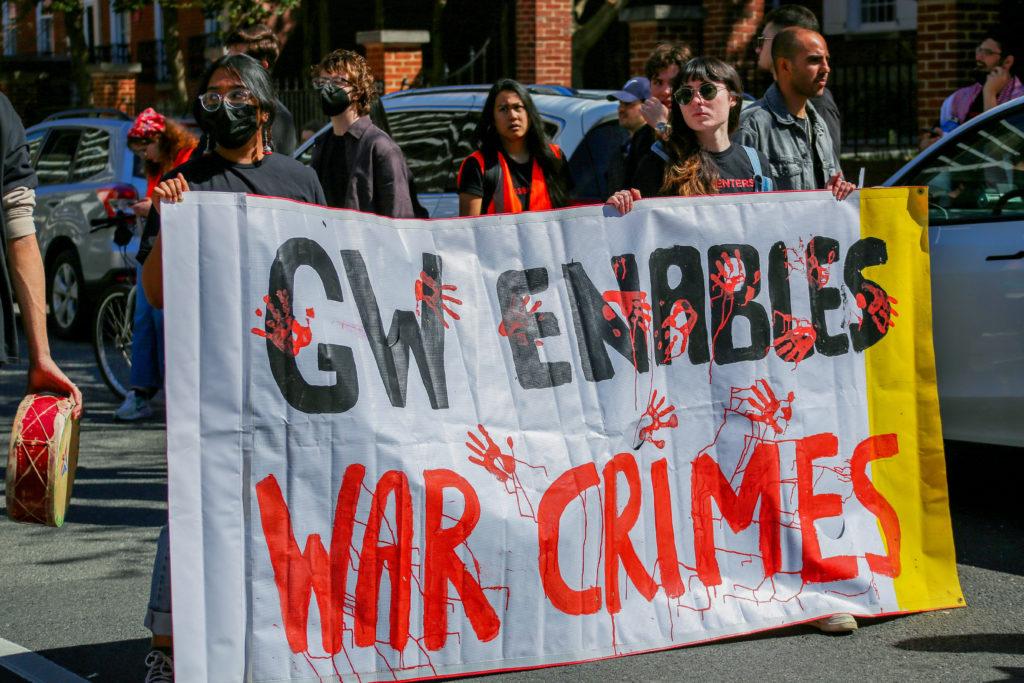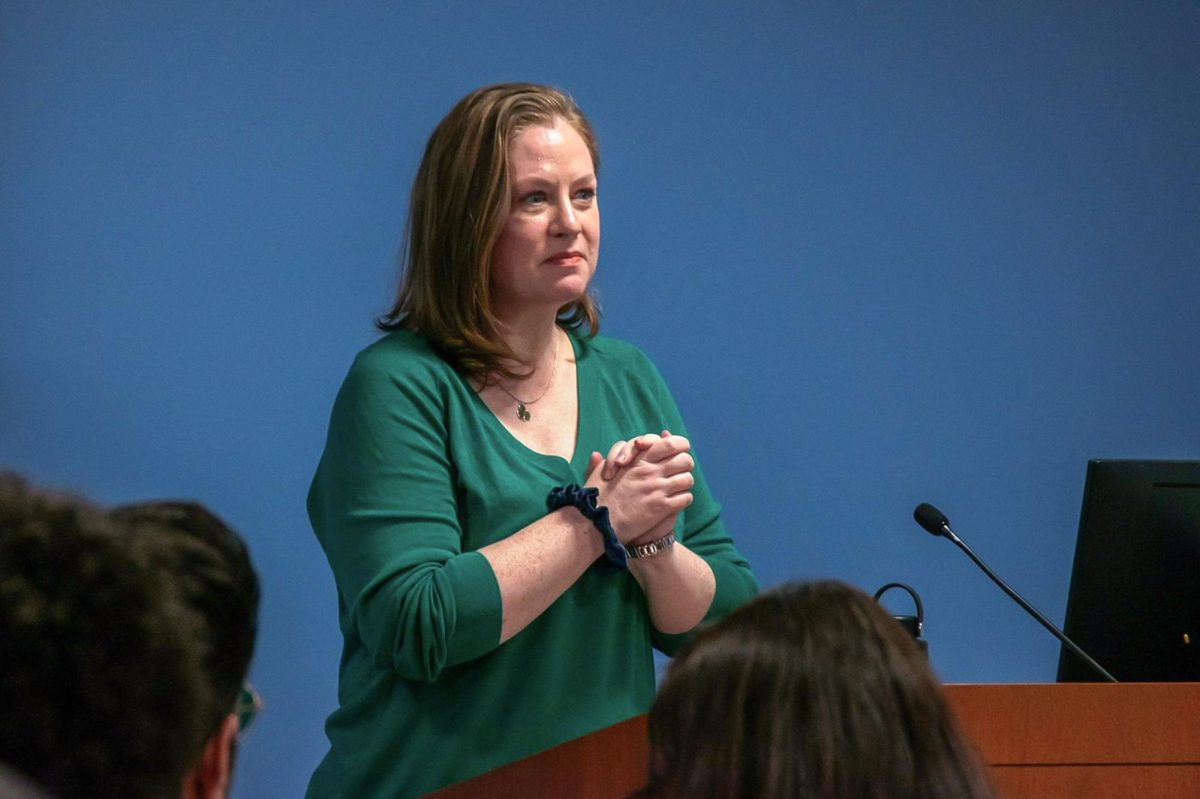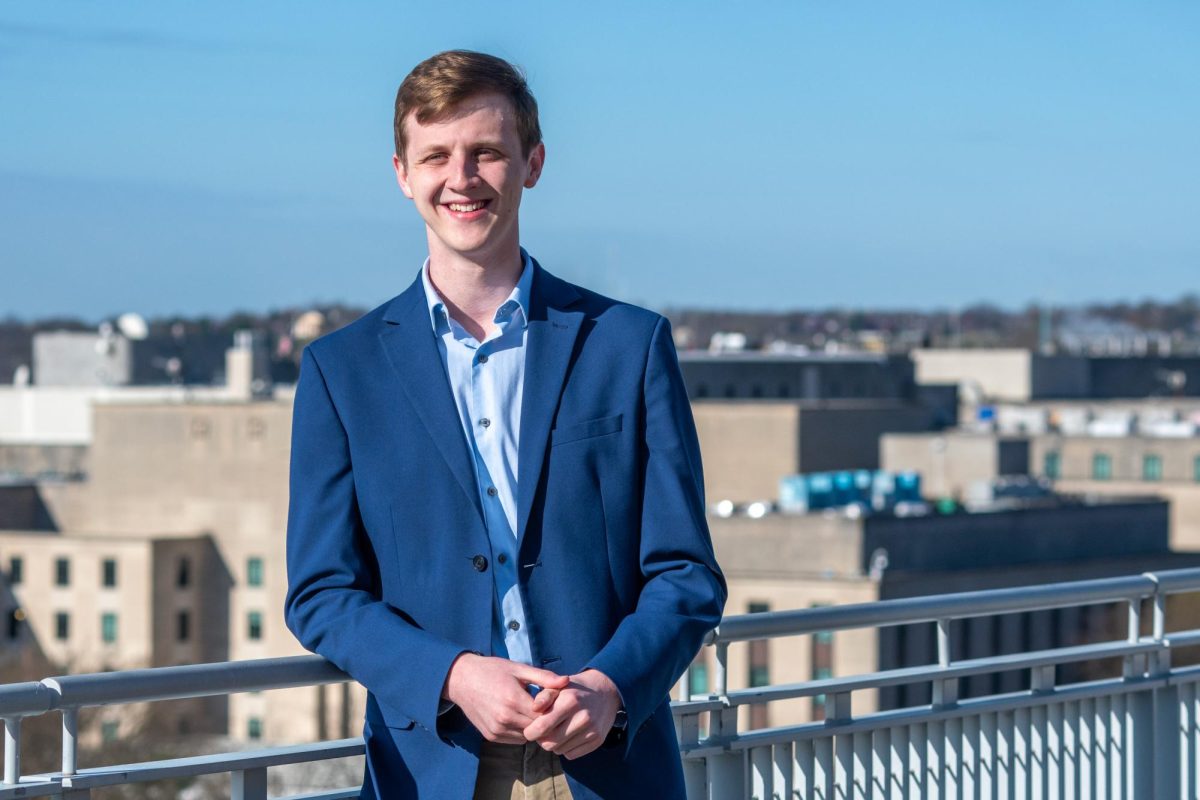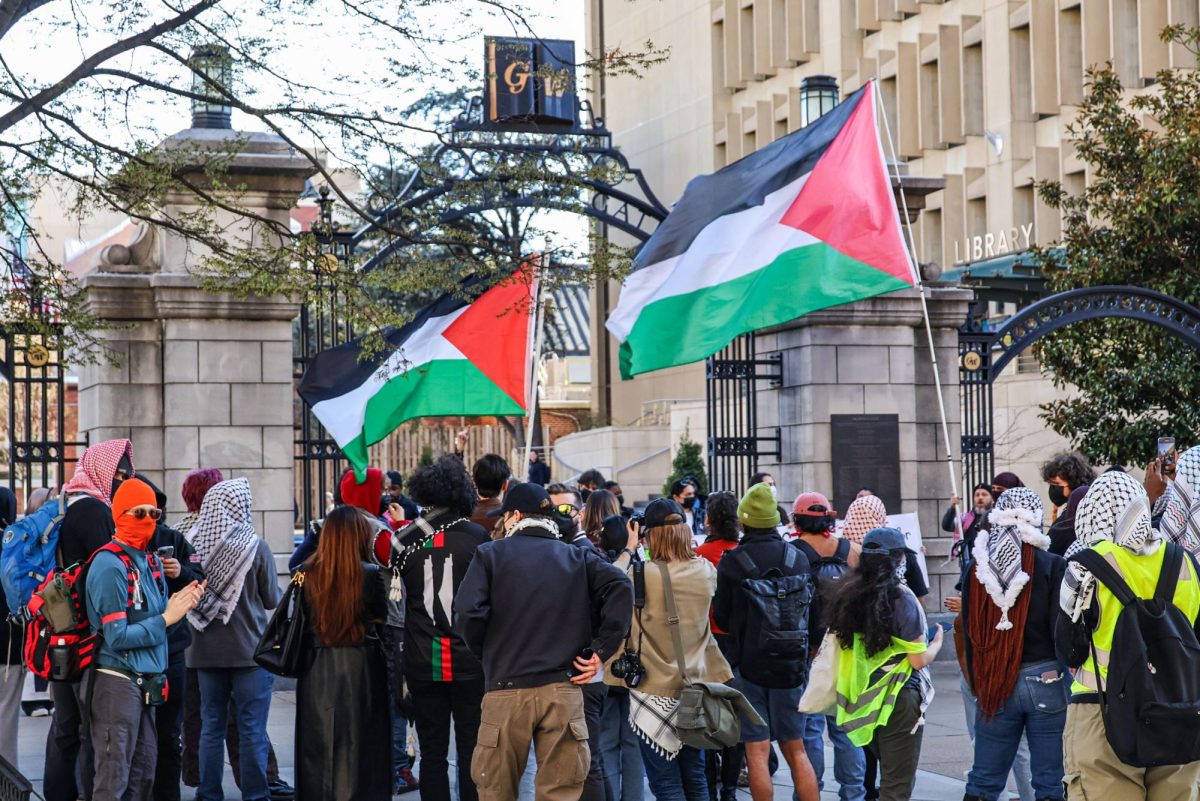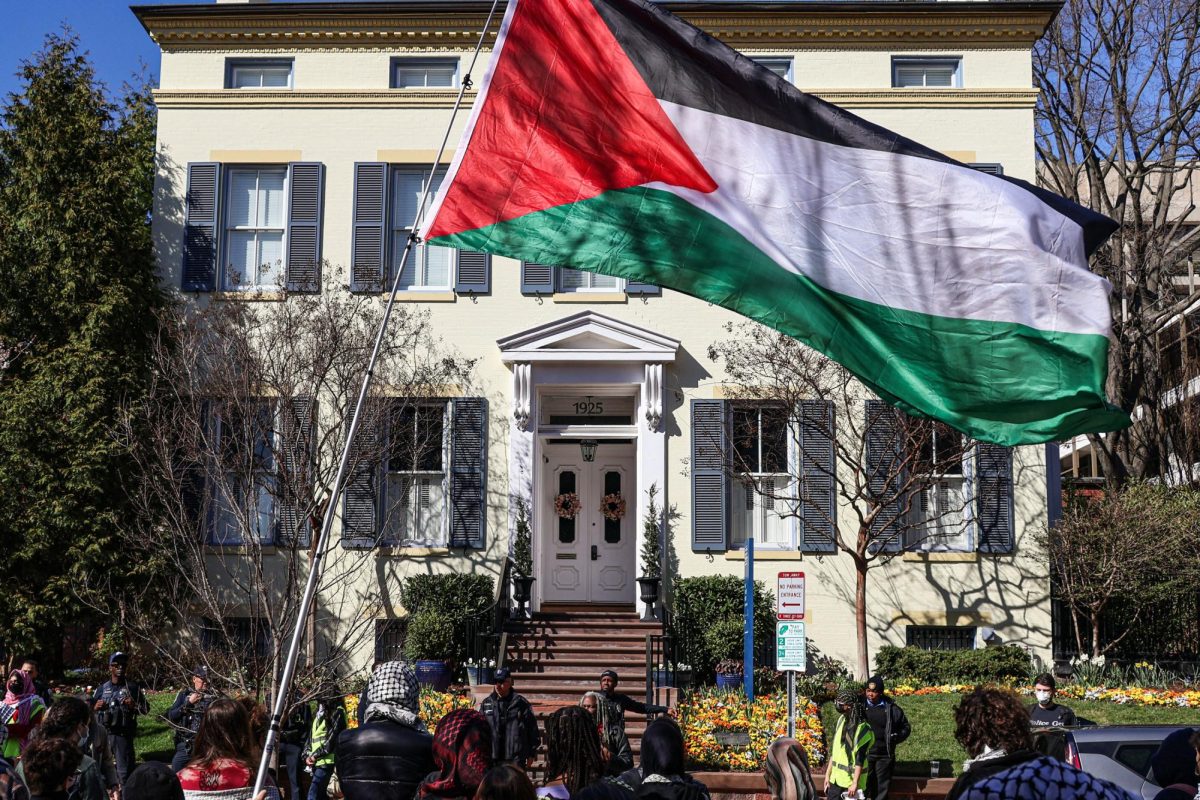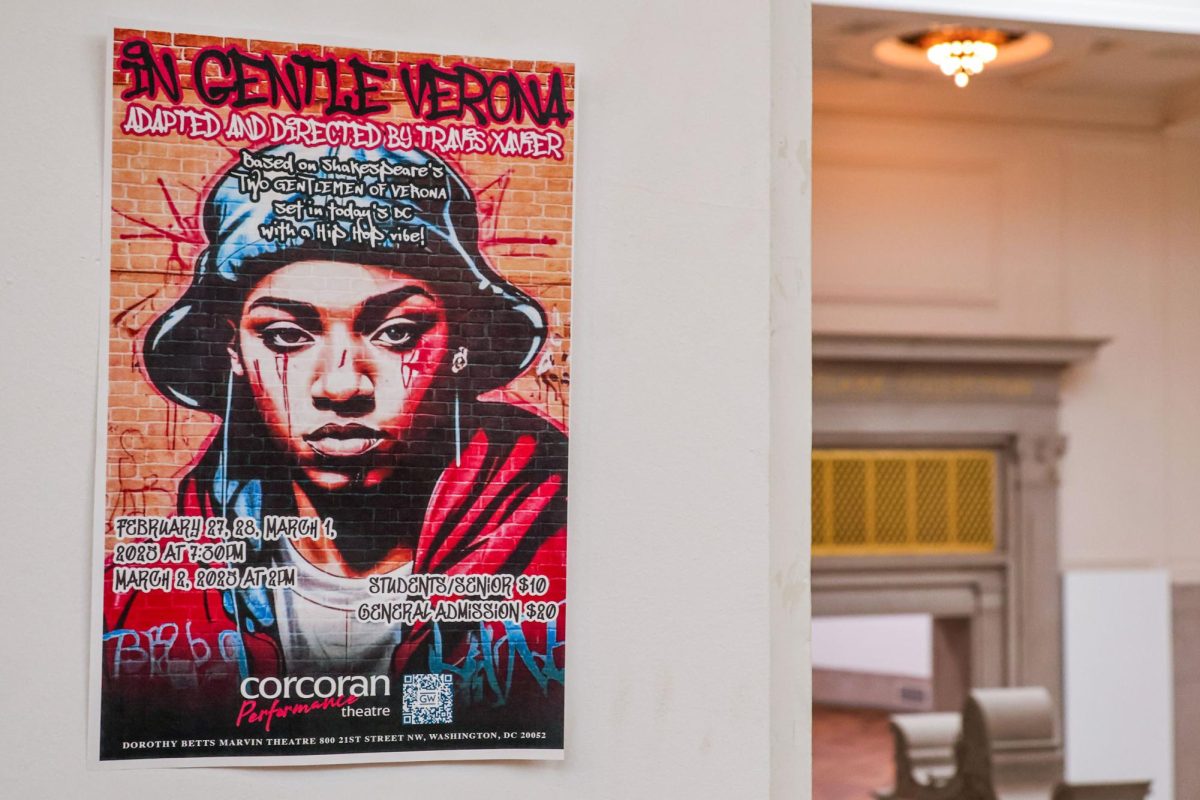Student war divestment coalition GW Dissenters hosted student protesters from seven other Dissenters chapters from across the country Sunday for a march through Foggy Bottom in protest of their universities’ investment in war and weapons manufacturers.
About 40 from GW, Howard, Johns Hopkins, Hampton, Florida State universities and the Universities of Virginia, Massachusetts and Houston rallied in Kogan Plaza before marching to interim University President Mark Wrighton’s F Street House and continuing on to the State Department during a 2-hour-long demonstration. Student demonstrators said they hoped the interregional rally, the most recent action in GW Dissenters’ Divest from Death campaign, promoted training and community building with other student activists across the country and pressured their institutions to commit to divestment from war and weapon productions.
GW Dissenters launched a petition in November calling for the Board of Trustees to divest from top weapon manufacturers, garnering more than 300 signatures, and questioned trustees on their divestment plans after an executive session last month. According to pamphlets handed out at Sunday’s rally, GW allegedly receives funding from the top five weapons manufacturers – Lockheed Martin, Boeing, Raytheon, Northrop Gruman and General Dynamics.
University spokesperson Julia Metjian said GW does not make investment decisions on a company-by-company basis. She said the University is aware of GW Dissenters’ petition and will review its recommendations for divestment.
“The endowment is invested in a diverse portfolio of funds that are adjusted regularly,” Metjian said in an email. “The University works to ensure that the endowment is managed in a legal and ethical manner.”
Former University President Thomas LeBlanc rejected a Student Association Senate proposal in 2018 calling on the University to divest from companies providing weapons and services to the Israeli government, which reportedly contributed to Palestinian human rights abuses, saying the resolution did not reflect the University’s views.
Senior Jelina Liu, the founder of GW’s Dissenters chapter and an organizer of Sunday’s rally, said GW Dissenters’ priorities are to meet with officials and initiate conversations to urge them to divest from the weapons industry.
“Our main message is that, obviously, we want the University to divest from the weapons industry and at least meet with us,” Liu said. “That’s the bare minimum.”
Liu said when the group confronted trustees after an executive session of the Board last month, trustees like Chair Grace Speights said they would consider the petition but didn’t commit to divestment. She said Trustee Mark Chichester expressed willingness to talk to students and hear their concerns about divestment but hasn’t met with GW Dissenters.
“He’s like, ‘Oh, actually, you can’t set up a meeting with an individual trustee,’” Liu said. “And then when we just kind of pressed him, he just was like, ‘Oh, you guys are being rude and discourteous.’”
Liu said Dissenters is working to center diversity as a priority for the divestment movement and amplify the voices of students of color in an attempt to progress from the predominantly white activism of the anti-war movement during the Vietnam War era.
“I wanted to emphasize that it’s predominantly students of color,” she said. “It was formed just because the current anti-war movement is very much like old white people, which is fine, but, you know, we want to diversify that sh*t.”
In June 2020, the Board voted to fully divest the University’s endowment from fossil fuel companies by 2025. Liu says this commitment provides a “precedent” for GW Dissenters’ push for war-industry divestment.
Ren Encinas, an organizer of the national Dissenters organization, said they came to GW from Chicago to support students in their “fight against war and militarism” and join GW students’ calls to demand the trustees remove GW’s investments from weapons manufacturers.
“Students here are organizing against GW Board of Trustees’ investments in weapons manufacturers and this is a struggle that is shared by all of our campuses across the United States,” Encinas said.
Encinas said that as part of their role in the national organization, they train and coach student members through fellowship programs with students from universities across the country in hopes of molding student activists’ skills to become “antimilitarist organizers.”
“The other students and chapters here are also waging divest from death campaigns or counter recruitment campaigns that are all targeting our University’s ties to militarism and war,” Encinas said.
Junior Ruby Brayton, a member of GW Dissenters, said holding the protest on the heels of the 20th anniversary of the United States’ invasion of Iraq March 20 was symbolic in emphasizing the length of the country’s hand in the war. Brayton said it was jarring to realize some of her friends have not experienced a time in U.S. history when the country has not been involved in a war, and she hopes to bring awareness to the millions of lives that have been lost to the “U.S. war machine” to fight for an end to the destruction.
“We need to invest in mutual aid and caring for our neighbors and having an enveloping sense of love and support, rather than just investing in death and endless war,” Brayton said.
Freshman Veronica Hernandez, a member of Howard University’s Dissenters, said she participated in Sunday’s protest because she does not support Howard’s investment of money into the military, which could instead be directed to student funding. She said Howard has permanent military recruiters on campus and people who “provide military and research internships,” when she would like to see more resources for students instead, following over a month of protests last year demanding Howard officials for better housing conditions after students found mold in the walls of their residence halls and a lack of COVID testing on campus.
“We have mental health resources, we have better food, we have more students who are guaranteed housing,” Hernandez said. “Because a lot of students, especially at Howard, live in their cars, you know, and they come and they take classes at Howard, but they don’t have a place to live.”
Jennifer Igbonoba contributed reporting.


